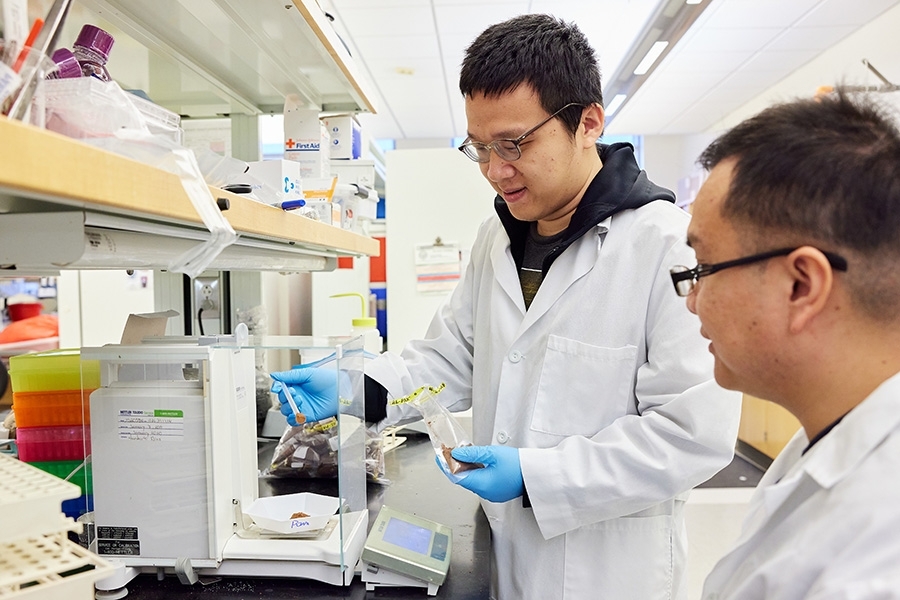We reach more than 65,000 registered users in Dec!! Register Now

OU Research Reveals Accelerated Soil Priming Under Climate Warming
- March 05, 2024
- 11 Views
- 0 Likes
- 0 Comment
A first-of-its-kind study led by researchers at the University of Oklahoma highlights a crucial biosphere feedback mechanism and its effects on releasing soil carbon into the atmosphere.
Jizhong Zhou, the director of the Institute for Environmental Genomics and George Lynn Cross Research Professor in the School of Biological Sciences at OU, is the corresponding author of, “Experimental warming accelerates positive soil priming in a temperate grassland ecosystem,” recently published in Nature Communications. Zhou said the study is the first to utilize laboratory and field experimental data to calibrate climate change ecosystem models.
This is also the first study to provide evidence of the acceleration of soil priming by climate warming in a temperate grassland ecosystem. The findings suggest that soil priming could play a significant role in terrestrial carbon cycle feedback processes and climate change.
Soil priming—the response of microbial decomposition of native soil organic carbon to fresh carbon inputs—is an important feedback mechanism that could potentially release more soil carbon into the atmosphere. Zhou says the actual relationship between terrestrial carbon and climate is one of the greatest uncertainties in forecasting climate warming in Earth system models. Soil organic carbon is critically important for soil health, food production, ecosystem functionality and climate regulation.
The study found that experimental warming increased soil priming in a temperate grassland ecosystem by changing the functional structure of microbial communities in the soil. The field portion of the project was conducted at Kessler Atmospheric and Ecological Field Station, an environmental research and education facility located at the University of Oklahoma. The proximity of the site allowed for frequent measurements to be taken, a unique facet of the study.
The field results and laboratory-derived active microbial information were incorporated into an ecosystem model. The study found that incorporating microbial mechanisms and information into the model improved model certainty and the accuracy of predictions.
The findings of this study have important implications for the projection of ecological climate change consequences. Because the study found that warming accelerates soil priming, and because this has not been fully accounted for in previous research, the detrimental effects of warming on Earth’s ecosystems could be more severe than was expected when not accounting for soil priming. However, understanding changes in microbial activities due to warming could lead to counteraction via in situ engineering of microbiome interactions.
“Our findings highlight the intricate relationship between climate warming, microbial communities and soil carbon dynamics,” said Zhou. “Understanding these mechanisms is crucial for developing effective strategies to mitigate climate change.”
“Long-term projection revealed that warming-enhanced soil priming can lead to considerably higher heterotrophic respiration, and hence considerably more CO2 emission,” said Xuanyu Tao, the other leading author of this study and a postdoctoral research associate at OU. “If such microbially mediated positive soil priming effects occur generally across different spatial and temporal scales, the potential positive feedbacks of soil priming to climate warming may be more than previously predicted.”
List of Referenes
- Xuanyu Tao, Zhifeng Yang, Jiajie Feng, Siyang Jian, Yunfeng Yang, Colin T. Bates, Gangsheng Wang, Xue Guo, Daliang Ning, Megan L. Kempher, Xiao Jun A. Liu, Yang Ouyang, Shun Han, Linwei Wu, Yufei Zeng, Jialiang Kuang, Ya Zhang, Xishu Zhou, Zheng Shi, Wei Qin, Jianjun Wang, Mary K. Firestone, James M. Tiedje, Jizhong Zhou. Experimental warming accelerates positive soil priming in a temperate grassland ecosystem. Nature Communications, 2024; 15 (1) DOI: 10.1038/s41467-024-45277-0
Cite This Article as
No tags found for this post









